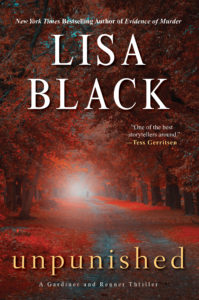 Today we welcome back to TKZ our friend and fellow ITW member, author Lisa Black. Enjoy!
Today we welcome back to TKZ our friend and fellow ITW member, author Lisa Black. Enjoy!
By Lisa Black
Who hasn’t wanted to be a newspaper reporter at some point in their life? Chasing a big story, elbowing your way up to shady corporations, reluctant witnesses, crusading leaders? Living on coffee and take-out, your only uniform a pair of jeans and a worn leather jacket, with the ever-present notebook and pen in hand? Comforting the afflicted and afflicting the comfortable?
At least that used to sound glamorous to me. Now it just sounds exhausting.
But I still love newspapers. Reading the day’s edition, delivered to a box at the end of my driveway, over a cup of tea is my favorite part of the day. So when I decided to set the second Gardiner and Renner book around a large city newspaper, I knew it was the right decision.
I did a ton of research, but one book that was more fun than work is titled Gimme Rewrite, Sweetheart…. It is a compilation of memories of reporters for the two major Cleveland, Ohio newspapers from when Cleveland still had two papers. Like most cities it now has one and that one only provides home print delivery four days per week.
Reporters in a bygone era could be assigned to the police beat, and their schedule became dictated by the police radio which sat on a shelf for constant monitoring. Fires, traffic accidents, helpful dispatchers warning officers that they might need noseplugs for a week-old welfare check gave the reporters a quick summary of what the story might be. But of course they couldn’t really know until they got there.
Some other tidbits of information from this book:
You may wonder why stories are ‘buried’ near the obituaries. Editors have no way to know how many people will die on any particular day so they leave a little room open near the obituaries. Late-breaking stories are placed there because there is space, not because of any editorial decision.
A reporter got on the good side of some mobsters at their trial by stealing 20-30 year old photos of them from the newspaper’s archives. Giving each a photo and saying, “Look, this is you when you were, like, 22,” made him their new buddy and got them chatting.
Back in the heady days of large staffs, each paper had specialized writers. There were religion writers, aviation writers, medicine writers. At one point both papers had dog writers.
Game-changing stories don’t always have to be herculean, dramatic efforts. One reporter, with help from the hospital’s employees, simply wandered around a hellish psychiatric ward for a day. When the state governor read the story, he strengthened state regulations to improve conditions. Another reporter wrote a story on Savings & Loans soaking home buyer on fees (one of the practices which would cause the entire economy to crash in 2008) and wound up taking on the inimical Freddie Mac. But the local Congresswoman happened to be on the House Banking Committee and Freddie Mac happened to be asking the Committee to do an IPO. Freddie Mac wound up having to make information public and belatedly enforce its own rules.
Or smaller stories—a car dealership beloved in the area for its corny TV commercials ran a contest where they awarded a car to a worthy person. The college girl winner had a father recently disabled from a heart attack, but the car she won got two flats on the way home and the exhaust system fell off. A reporter wrote the truth. Luckily for the reporter the dealership didn’t advertise in the paper, so the paper ran the story anyway—the dealership sued, but the reporter won the lawsuit. The truth, it seemed, was still a valid defense.
Some things don’t change.
****
It begins with the kind of bizarre death that makes headlines—literally. A copy editor at the Cleveland Herald is found hanging above the grinding wheels of the newspaper assembly line. Forensic investigator Maggie Gardiner has her suspicions about this apparent suicide inside the tsunami of tensions that is the news industry today—and when the evidence suggests murder, Maggie has no choice but to place her trust in the one person she doesn’t trust at all….
Jack Renner is a killer with a conscience, a vigilante with his own code of honor. He has only one problem: Maggie knows his secret. She insists he enforce the law, not subvert it. But when more newspaper employees are slain, Jack may be the only person who can help Maggie unmask the killer–even if Jack is still checking names off his own private list.
UNPUNISHED available January 31 wherever books are sold!
www.lisa-black.com
Twitter: @LisaBlackAuthor
Lisa Black has spent over 20 years in forensic science, first at the coroner’s office in Cleveland Ohio and now as a certified latent print examiner and CSI at a Florida police dept. Her books have been translated into 6 languages, one reached the NYT Bestseller’s List and one has been optioned for film and a possible TV series.
www.lisa-black.com
@LisaBlackAuthor


Lisa, congrats on the new book.
Two highly entertaining memoirs on my shelf are from journalists: Ben Hecht’s A Child of the Century, and H. L. Mencken’s Newspaper Days. Some wild stuff back in those days.
As for movies about journalism, you can’t beat His Girl Friday and All The President’s Men. There’s also the less-well-known but compulsively watchable Shattered Glass, the true story of the Stephen Glass scandal at The New Republic.
Ooh, I haven’t seen Shattered Glass–just ordered it from Amazon. Thanks, Jim!
Thanks for sharing your research, Lisa. I found the information about the obituary space especially fascinating. Who knew? I have a dear friend who’s “an old newspaper guy,” as he says. I’d be happy to pass along his info. if ever a question arises that you can’t answer. UNPUNISHED looks fantastic. Adding it to my TBR list!
Thanks in return for the info and tips! I’ve always been a newspaper junkie but I had no idea how interesting the topic would be when I started writing the book.
Thanks for a nostalgic trip down memory road, Lisa! I went to Columbia J School with starry eyed notions of becoming a reporter in the Woodward-Bernstein mold, only in broadcasting (as did most of my graduating class in the broadcasting department, I suspect). I have watched with dismay and horror as the profession of journalism has deteriorated to such an extent that it has become unrecognizable. So glad I didn’t stay in that field! I love that your local newspapers were so comprehensive in covering the local scene that they had people on the “dog beat”. That made me smile! ?
Welcome back to TKZ, Lisa. Unpunished sounds terrific. Thanks for sharing the research. I confess I never had a desire to be a journalist–I think I was too shy. I’m happy in my made-up world with a little research on the side.
Me too. I loved the idea but I know I couldn’t really have done it.
Lisa, You brought back memories. I was a reporter and editor at California dailies for better than 20 years (in and out of the biz twice) and I use this as background for my Amy Hobbes Newspaper Mysteries series. I was with the San Jose Mercury-News during the late 60s and into the Watergate era and we had a LOT of interaction with the cops who asked us to name people in protest pictures.Was on Nixon’s enemy list and had my phone tapped. Later, as the City Editor for a Central Valley paper, had a young reporter cover a high profile kidnapping and rape. The guy was caught, the reporter was allowed a jailhouse interview and BOTH the prosecution and defense subpoenaed her notes. And later at a large daily, I was the lead editor on and off during the Yosemite murders. Weird and interesting things, but it’s not what it used to be. I still have friends at the Sacramento Bee, the San Francisco Chronicle and the LA Times but everyone knows the handwriting is on the wall. Even the young reporter went on to a long career with the AP and CNN, but she’s left the print media and is now a producer for Turkish World Television and lives in Istanbul.
Wow!! Very interesting!
Lisa-
Your book sounds fascinating. Medicine and forensics are key in my writing and I will definitely be giving your book(s) a try 🙂
BTW I’d add “Spotlight” to the list of films JSB mentioned featuring newspapers (a fact-based account revealing how reporters exposed the heinous crimes of priests and the corruption of cover-up). Compelling.
Thank you